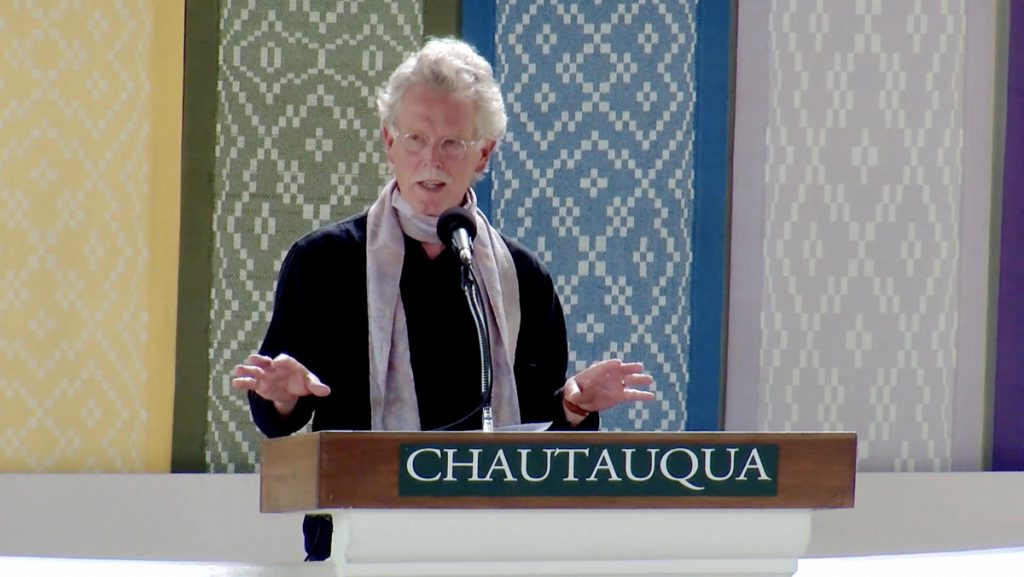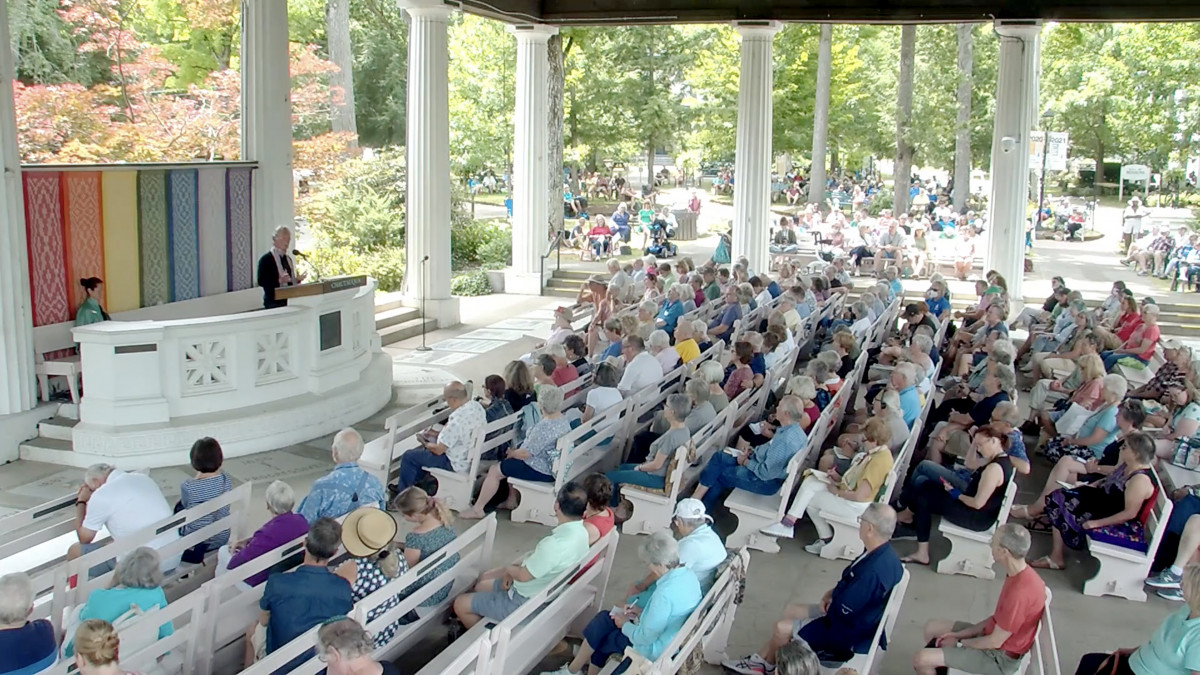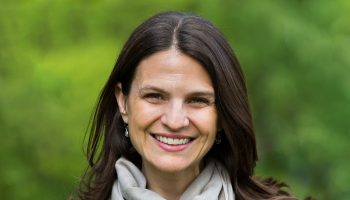Among the presence of divine and sacred nature, becoming in tune with other living beings on Earth may be the closest humans can feel to God.
John Philip Newell, a Celtic teacher and author, closed Week Two’s Interfaith Lecture Theme, “Reconnecting with Our Natural World,” with his lecture Friday, July 8, in the Hall of Philosophy, “The Grace of Nature.”
Newell has led several international pilgrimages to Iona off the western coast of Scotland, and he has authored over 15 books, with his most recent publication, Sacred Earth, Sacred Soul: Celtic Wisdom for Reawakening to What Our Souls Know and Healing the World, earning several awards. He has spoken at Chautauqua before through the Interfaith Lecture Series and the morning worship services, but this is his first time back on the grounds since 2016.

“It is so good to be back in Chautauqua and in this space that opens so beautifully and naturally onto what the Celts call a cathedral of Earth, sea and sky,” Newell said.
Within nature, one can reflect or listen to the divine hum of the Earth. Listening is a highly-regarded practice for Celts.
“Perhaps the most cherished image that comes down to us in the Celtic tradition, from which I draw so heavily in my life … is the image or the memory of John the Beloved leaning against Jesus at the Last Supper,” he said. “It was said of him in the Celtic world, that he, therefore, heard the heartbeat of the divine, and he became a symbol of the practice of listening — listening deep within ourselves, listening deep within one another, listening within the body of Earth — for the beat of the sacred presence.”
Newell called for attendees to take the same posture of attentiveness and listening to become intrinsically connected to all sacred, living things. Yet, every being is idiosyncratic.
“Everything that has being is essentially an utterance or expression of the divine,” Newell said. “This, I believe, holds the energy for deep and true transformation, or a reconnecting of us to our essence — each one of us, a unique and unrepeatable expression of the one.”
Paraphrasing the beginning of John’s Gospel, Newell depicted the interconnectedness of everything that has ever been and everything that will ever be.
“In the beginning was the sound. And the sound was with God, and the sound was God. And everything has been sounded into being,” he said.
Although recent times have been tumultuous, and the 2020s have been described as the “decisive decade,” Newell refers to the present as both exciting and profoundly challenging.
“Part of the excitement is a type of convergence between so much new science and ancient spiritual wisdom,” he said. “One of the things new science is enabling us to comprehend is that the sound of the beginning is still vibrating deep within everything that has being. And that sound has been identified by scientists as a B Flat, way down.”
Trained in Edinburgh, Scotland, by Irish priest Noel Dermot O’Donoghue, Newell said O’Donoghue had his own favorite paraphrase of the opening of John’s Gospel.
“His version was: ‘In the beginning was the gift, and the gift was with God. And the gift was God,’ ” Newell said. “Everything is essentially (a) gift, and not simply a gift given from God, but rather the gift of God — the gift of the sacred presence, deep within all that has being.”
Newell pointed to what Hildegard of Bingen said in the 12th century about awareness of the divine’s gifts through the observation of both beauty and suffering on Earth.
“She says, ‘We need to learn to fly with two wings of awareness. One is the wing of awareness of life’s beauty — life’s unspeakable glory,’ ” Newell said. “ ‘The other,’ she said, ‘is the wing of awareness of life’s brokenness and suffering. To fly with only one wing of awareness,’ she said, ‘is like an eagle trying to fly with only one wing. We will not attain a true height of perspective if we focus only on the beauty and glory and grace of life.’ ”
The Doctrine of Creation, Creatio Ex Nihilo, which literally translates to “creation out of nothing,” describes the creation of the universe by a distant, transcendent being out of nothingness.
“(Irenaeus of Lyon) says that the cosmos, Earth, all things were created out of the very substance of God. This stuff, the stuff of the human body, is sacred stuff,” Newell said. “How we handle one another in relationships … are sacred matters. How we handle the matter of the body of Earth, with reverence, and justly and equitably, are sacred matters.”
But the sacredness of religion has been misused to commit unholy, poisonous exploitation of humans and nature, Newell said. He provided the example of the Roman, British and American empires.
“When matter is neutralized, we begin to think that we can do whatever we wish to matter,” he said.
As nations exploit Earth’s resources, “in the fallacy of looking after its own well-being,” to harm the well-being of other nations, they are acting in the way “empire has expected of religion,” Newell said.
But there is hope. People, Newell said, are yearning for a reconnection between their spirituality and the Earth, which he has witnessed firsthand through leading pilgrimages to Iona, “the sacred island in Scotland that has been such a true voice over the centuries to the sacredness of Earth and sacredness of the human soul.”
People must become open to speaking and listening to all living things, or else the divide will continue to grow.
“Will we speak from this place of interrelationship with all things? Or will we continue to speak from enclosed places of separation from nature, or from one another, as nations, as great spiritual traditions?” Newell asked.
Newell said every great discipline of thought and study is summoning an awakening to the wisdom of the Earth flowing all around us. He explained the Greek word for a god, “theos,” derives from the Greek word for “flow.”
“So that flow of the divine is not simply to be found in some people, or at certain points, or in certain religious traditions, or in certain moments,” Newell said. “It is the very essence of all life, that we are being invited back into relationship with.”
The invitation of reconnection to nature is waiting, and Newell said this reconnection is essential to be truly connected to the divine. He professed that religion is not static, but rather ever-changing to allow great reformation.
“Thomas Berry, the eco-theologian, said … ‘We are in such a mess. Politically, ecologically, religiously, we are in such a mess.’ He says that we need to dream the way forward. We need to allow ourselves to imagine ways of being, ways of seeing, ways of interrelating that we have known nothing of yet,” Newell said.
The French mystic scientist, Jesuit priest Pierre Teilhard de Chardin, saw the universe as a “burning bush,” from the story of Moses.
“As my rabbi brother from New Mexico says, the important thing about that story is not that the bush was burning, but that Moses noticed, because every bush is on fire,” Newell said. “Everything that has being is lit from within.”
It is a critical time of transformation, Newell said, and somehow, the light of Jesus is not guiding humans. Some people have the impression that the light of Jesus is essentially foreign. But humans still want to follow it and grow closer to all energy.
“This dimension deep within us and in all things that invites union, that invites attraction, it is something of this that we know in the Universal Law of Gravitation. Every atom in the universe, at some level, longs to be in relationship with every other atom. Otherwise, the whole thing would spin off into unrelatedness,” Newell said. “Scientists don’t claim to understand this law of attraction, they describe it.”
Once humans can harness the outpouring of love and connection through the great energy of attraction, they can truly connect to the divine; Teilhard wrote that Christianity will experience a rebirth.
“(He) wrote, Christianity is at the end of one of his natural cycles of existence. It needs to be born again,” Newell said. “We are invited to be part of this new birthing in this transitional moment.”
Whatever happens as humans move forward and time passes, there is no turning back.
“We can’t go back to the small God — the small God that we have created in our image to look after just our nation, our religion or our species,” Newell said.





